#source: stranger on horseback
Explore tagged Tumblr posts
Text
[After water's thrown in his face.]
Drip-Along Daffy: Thanks, it's a hot day.
Nasty Canasta: I don't like what you said!
Daffy: I sthaid it was a hot day.
Nasty Canasta: Well, I don't like the way you said it!
0 notes
Text
Stew Pot Plot pt 4
Alternate Whumptober prompt #9: Drugging -- Time, Everyone
TW -- drugging, unconsciousness
733 words
Read it here or on AO3!
******
Time brought the ocarina to his lips and played the Sonata of Awakening.
“THAT ONE’S AWAKE!” One of the Yiga yelled shrilly. “STOP HIM!”
As Time let the ocarina fall away from his lips and come to rest on his chest, the magic of the song swirled around the camp repeating and echoing in the wind, rousing the sleeping heroes.
“Uh oh, what’s going on? What kind of magic is that?!” The other Yiga exclaimed as all around them, the heroes stirred and opened their eyes.
Time himself felt his strength return in a wave and his mind cleared. He pushed himself up as the last of the tiredness vanished. He swiftly lit a lantern and illuminated the sleepy camp and the red-clad invaders.
“What’s going on?” Hyrule asked stretching.
“Who are you?” Wind asked the stranger in red backing away from the camp.
“That’s a Yiga!” Wild exclaimed, suddenly very alert. “Asssassins!”
“Everyone up on your feet!” Time ordered. Legend was on his feet firing off an arrow before Time even finished his sentence. One of the Yiga grunted and clutched at the arrow protruding from their shoulder.
“Abort! Abort! Mission abort!” The Yiga yelled.
“I told you this wouldn’t work!” The other shouted in reply and fired an arrow back at Legend. Warriors lifted his shield just in time to save Legend from getting skewered and the arrow thudded embedded into it.
Thunder rumbled louder and louder and had the heroes and Yiga alike looking up into the sky above and the dark cliffsides searching for whatever storm or landslide or earthquake was the source of the noise.
A fierce and angry neighing and the pounding of hooves startled the heroes and Yiga and Epona charged into the camp leading a herd of wild horses, galloped straight at the Yiga with righteous fury.
“You haven’t seen the last of us! We’ll get you, Hero!” The Yiga screamed and vanished into the cloud of kicked-up dust and stampeding horses. The horses continued to circle and stamp and make angry horse noises for another minute as the rest of the heroes got to their feet, weapons in hand, searching for the enemy looking confused.
“What just happened?” Sky asked when the dust and the horses settled.
“I found a packet of sleeping herbs in the stew: we were unknowingly drugged and the Yiga tried to capture us,” Time explained and motioned to the herd of horses that now encircled the camp. “I told Epona to go get help, and she did.”
“If we were drugged unconscious, how are we awake now?” Warriors asked.
“I played the Sonata of Awakening” Time said holding up his ocarina. “You can stand down now, the danger has passed.”
“That explains why I fell asleep in the middle of cooking last night,” Wild said. “I kept tasting the stew as I went along to make sure everything was cooking alright.”
“You must have tasted a LOT of it to get knocked out like you did,” Hyrule said.
“Uhh maybe??” Wild grinned sheepishly. “What? I was hungry.”
“I don’t feel sleepy anymore, not even a little bit,” Wind said. “Which is weird because I was suuuuper tired earlier and it’s still the middle of the night.”
“That’s a side effect of the song; no one is going to get any more sleep tonight,” Time admitted.
“Strangely, I’m not even upset about it,” Sky said. “I’m completely wide awake… you should play that song more often.”
“What do you guys think about leaving and heading on to the stable now?” Four asked.
“Thanks to Epona, we now have enough horses for all of us to ride,” Twilight said rubbing Epona’s nose and slipping her a little treat from his pocket.
“We can make it to Gerudo Canyon Stable in no time at all on horseback,” Wild said. “As long as you guys can tame the wild horses.”
“Shouldn’t be any trouble at all,” Twilight said, already trying to pet and befriend the blue spotted horse, much to Epona’s annoyance.
“Breakfast at the stable?” Wind suggested. “A biiig breakfast? I’m hungry again.”
“Again? Already?” Legend said.
“Yep, growth spurt for sure,” Warriors laughed.
“I’m just glad we didn’t get captured and no one got hurt,” Sky said. “Thank you, Time.”
“Don’t thank me, thank Epona,” Time said. “Shall we get ready to go?”
“Breakfast! Breakfast! Breakfast!” Wind chanted and everyone laughed.
The End.
43 notes
·
View notes
Note
It might be cool to see dullahan for pride month. I don't think any original stories about dullahan are particularly queer but her depiction SMTIV is something I think about a lot. Taking a red pill and changing gender is definitely a more accurate interpretation of the matrix than other times people talk about the red pill at least lol
Dullahan - Day 49 (Request)
Race: Haunt
Alignment: Neutral-Neutral
June 6th, 2024

Yeah, shoutout to the random NPC in SMT IV who eats a red and instantly transes their gender. A true icon. Today's Demon of the Day is a very common fixture of medieval fantasy, however, and not just a bit of someone's true identity- the headless knight of no renown, Dullahan. Headless Horsemen are a common sight in many tales spanning Europe, the subjects of many a legend or fairy tale, but each of these halloween fables can trace their roots all the way back to Celtic myth, in the form of this unseelie fairie... or so some think. In truth, the origins of the Dullahan are unclear and murky, much like the foggy skies it mingles within, so let's dig in!
Ireland is no stranger to weird fairy tales- as the place where the term fairy originated from, Celtic myth is filled with tales upon tales of weird, loveable goons that paint stranger and stranger pictures of the times each time one thinks about them. Whether it be the oh-so-elusive Cat-Síth or the inanely wailing Banshee, Celtic folktales are filled to the brim with creatures at the forefront of each and every story... which is what makes the Dullahan so bizarre. While the concept of a headless horse-riding knight isn't too out there, especially in comparison to some other fairies (looking at you, Pooka), very few primary sources actually attest to the existence of the Dullahan, whether it be by name or concept alike.
However, in spite of this, we do have a few historical accounts- this makes the Dullahan's existence frustratingly vague, to say the least, as it's impossible to say if it did or did not exist- either possibility is plausible, especially given that artwork depicting the Dullahan does exist, dating back to the 1800's. As according to Doris V. Sutherland, the earliest reference to the Dullahan can be found in 1802, within a text written by Charles Vallancey called "Prospectus of a Dictionary of the Language of the Aire Coti, or Ancient Irish, Compared with the Language of the Cuti, or Ancient Persians, with the Hindoostanee, the Arabic, and Chaldean Languages." Kind of a mouthful. Within the book, which is a compendium of all sorts of languages and drawn comparisons between them (among all sorts of other stuff, I'm too lazy to find a free copy of it online though lol), there is a segment in which Vallancey draws a comparison between the Irish Dullahan and an Arabian demon, the Wulahan.
"The Dullahan or Wullahan is a terrible bug-bear at this day; the peasants hear him in the night dragging a heavy chain through the villages and along the roads; this is the wulahan, or Satanas of the Arabs…"
As pointed out by Sutherland, though, the brief description given of only a few passages has no mention of it being headless. So why is it commonly seen as being headless? Skip ahead a few years and we get to a book by Thomas Cofton Croker going into the fairies of Irish folklore, and stories pertaining to them. Among the many fairies listed in this book, entitled "Fairy Legends and Traditions of the South of Ireland," we get to our second mention of the Dullahan! In one of five segments, a tale is given regarding a man named Larry Dodd who gets a random hitchhiker one day atop horseback- a mysterious woman whose every feature was covered by a cloak. She climbs aboard after he offers so, and they take off.
After a few moments of silent, uncomfortable riding, the woman exits suddenly to head to a nearby church. Smitten, Larry chases after the woman to try and pursue a thank-you kiss, but when he catches up with her... shock! Horror! She has no head! So that's where the idea of the Dullahan came from as being headless- and likely why the Dullahan in SMT is so feminine in appearance as well. After witnessing a dance of the Dullahans in the dead of night, he's decapitated... only to come to a few hours later, confused from the whole sordid affair.
This tale is only one of four, however- the general idea of Dullahans and the Headless Horsemen being synonymous actually came from this same book as well. A later story is, well, quite literally the fable of the Headless Horseman! From these tales, we can glean quite a few things- almost every account of the Dullahan comes from this book, with the name being spurned from the Prospectus and its offhand mentioning of the 'Irish Dullahan' as though it were common knowledge. I'm of two minds here, personally- for one, it's entirely possible that Croker, pardon my french, just made some shit up, basing his fables on pure speculation as to what the Dullahan name could mean by connecting it to the Arabian Wulahan. However, the other possibility, one that I personally subscribe to, is that the Dullahan was a part of the tapestry of Celtic folklore- it was just obscure.
The tales presented clearly speak of the Dullahan as though it were a preexisting concept, and the offhand mention of its existence in the Prospectus seems to give light to the idea that it did, indeed, exist in the cultural consciousness to some extent. Of course, this is all purely guesswork on my end- unless Croker digs himself out of his grave to answer my burning questions, I doubt I'll find an exact answer to this line of thinking- but I think it makes the most sense given what little information we have to work off of.
Now, in terms of representation in SMT... It sure is a headless knight. One aspect I really adore in this design, though, has to be the way the top of the head appears- the implication of the Dullahan being able to freely attach and detach its head like the joints on a Bionicle is hilarious, and gives a whole new line of depth to this already cool looking design. The silver, deep purple, and gold all combine to make the knight look regal, as though it was a stalwart protector of a kingdom under the king's right hand that had now fallen into disrepair. Somewhat fitting, given that it appears most prominently in SMT IV as a boss!
Lastly, though, I've gotta say I'm so glad we're almost to 50 posts. I didn't expect this series to last this long, and we've got a big, big one coming up for post 50, so I hope you're all excited! Happy Pride Month, and I need to say thanks for sticking with me, all this time.
#smt#shin megami tensei#megaten#persona#daily#ask#dullahan#the fact that my primary source for this one was another trans person is not lost on me lmao#esp given that the npc eating the red is very#VERY. trans coded#all that aside#holy shit#we're almost at 50 posts!!!#the next one is gonna be a biiiig one#i hope y'all will look forward to a big ol' bug
12 notes
·
View notes
Text
Platonic communal sleeping in the American colonies
Platonic bed-sharing was actually quite common custom in the colonies, especially during time's of need, after all, space and privacy were a luxury of the wealthy. It didn't necessarily have to be intimate either, it was not uncommon for sometimes even complete strangers - often travelers or soldiers - of the same sex to share a bed together at an Inn if there was little space, and needed room. Samuel Pepys, an 18th century diarist, often slept with male friends and wrote about the conversations they would have at night. [x]
Rotundo also explains that; “It is not too much to suggest that in an era before central heating, the body warmth of an already beloved bedmate may have been so welcome as to be a source of emotional as well as physical pleasure.” And implies that while it was most of the time done out of necessity, it was also oftentimes simply a warming act of affection, romantic or platonic; “This was, after all, a culture that fervently contrasted the secure and cozy warmth of home with the coldness of a cruel and heartless world outside… A bed, when shared with a special person, could become a nest of intimacy, a place of casual touch and confidential talk.” [x]
Additionally, during the days before central heating was truly a common thing (Especially if you weren't royal or wealthy), bedmates were also seen as warmth. Oftentimes servants even slept alongside their mistresses. This was also how many sicknesses would spread, as bedbugs and lice were transported from person to person in the colonial period usually when sharing bunks or close quarters.
Even notable figures took part in this custom, like Robert Troup and Alexander Hamilton, as Chernow writes how the two shared beds while studying law together at King's College; “At King's, Troup wrote, ‘...they occupied the same room and slept in the same bed’” [x]
Which also leads to a humourous story about when John Adams slept with Benjamin Franklin in a New Jersey tavern during the fall of 1776. Just ten days prior, Washington and his men had barely escaped capture on Long Island after a suffering defeat to the British. The Continental Congress had debated for days about what was to be done. The British had captured General John Sullivan during the Battle, Earl Howe and his brother William Howe paroled Sullivan so he could take a message to Congress, as they wanted a talk peace. Eventually, Sullivan went to Philadelphia and spoke to Congress about the peace talks, to which the Congress decided that they would send a three-man committee to Staten Island. Which was composed of; Benjamin Franklin, Edward Rutledge, and Adams. The men represented the northern, middle and southern colonies. The three had set out on September 9th, Franklin and Rutledge each in a two-wheeled chaise, Adams on horseback. Later, the three men arrived in New Brunswick, and unfortunately had found the Inns all too crowded. Which led to Franklin and Adams having to share a tiny room, barely bigger than the bed, without a chimney, in the Indian Queen Tavern. Which then began an interesting debate, as they prepared to retire;
The window was open, and I, who was an invalid and afraid of the air in the night, shut it close. “Oh!” says Franklin, “don't shut the window, we shall be suffocated.” I answered, I was afraid of the evening air. Dr. Franklin replied, “The air within this chamber will soon be, and indeed is now, worse than that without doors. Come, open the window and come to bed, and I will convince you. I believe you are not acquainted with my theory of colds.” Opening the window, and leaping into bed, I said I had read his letters to Dr. Cooper, in which he had advanced, that nobody ever got cold by going into a cold church or any other cold air, but the theory was so little consistent with my experience, that I thought it a paradox. However, I had so much curiosity to hear his reasons that I would run the risk of a cold. The Doctor then began a harangue upon air and cold, and respiration and perspiration, with which I was so much amused that I soon fell asleep, and left him and his philosophy together, but I believe they were equally sound and insensible within a few minutes after me, for the last words I heard were pronounced as if he was more than half asleep. I remember little of the lecture...
Source — The Works of John Adams, Volume 3, by John Adams
Especially during time of war, when the revolution was rough, and means were low. Or as some day; “These are the times that try men's souls”. If the army was running low on space, or even beds, many - if not most - men resorted to sharing the same bed. Although this particular custom was not as accepted by many European visitors who came to the colonies, this cultural difference was often completely condemned by them. Pierre Du Ponceau - an aide of Baron von Steuben's - wrote of a particular dispute between a Virginian and a Frenchman about the subject in his autobiography;
One evening at an Inn in Virginia, a Frenchman and a Virginian were discussing about the manners of their respective countries. The American exclaimed violently against the horrid custom of the French of kissing one another at meeting and parting. The Frenchman made no answer, but as it was late, he took his candle and went up to bed. He was soon followed by the Virginian who after undressing came to take his place in the same bed with his companion “Stop, Sir,” said the Frenchman, “that won't do—I shall kiss you as much as you please, but by Jupiter, I'll not sleep with you.”
Source — Autobiographical Letters Of Peter S. Duponceau
It seems like this custom was almost exclusively English/Colonial, as David Montagu Erskine wrote to his father in 1799 of the living arrangements he and his companions encountered among the transient inhabitants of Washington, DC;
Each of us have a bed room to ourselves, if we chuse, but people in this country seem to think so lightly of such an indispensable comfort as I consider it, that I believe there are but three of us, who have rooms to ourselves.
Source — Menk, Patricia Holbert. “D. M. Erskine: Letters from America, 1798-1799.” The William and Mary Quarterly, Volume 6.
Edward Thornton, secretary to the new British minister to the United States, wrote to his former employer in 1792;
Mr. Hammond's rank may possibly secure him from some of the inconveniences, which others, rendered fastidious by the style of travelling in England, are loud in their complaints of, such as [...] fellow lodgers in the same room and not infrequently in the same bed.
Source — Jackman, S. W. “A Young Englishman Reports on the New Nation: Edward Thornton to James Bland Burges, 1791-1793.” The William and Mary Quarterly, Volume 18
This custom was even common after the revolution and the war of 1812—As Lieutenant John Le Couteur, a British army officer from the Isle of Jersey, traveled through New York in 1816 accompanied by Captain George Thew Burke. Le Couteur and Burke arrived at an Inn one day after dinner had been served and cleared, and they were hard-pressed to convince the hostess to bring out more food, “But this was not the last grievance.” Le Couteur recorded in his diary and concluded;
There was only one spare bed, a small one, which of course I insisted Burke should take. The Yankee Landlord wished me to take half of it as a matter of course but I said: “we Britishers were particular on that pint.’ “Then,” said mine host, “I guess if you don’t chuse to take half a bed with some one, you’ll jist sleep in a cheer [chair] or by the kitchen fire’
Source — Male-Male Intimacy in Early America: Beyond Romantic Friendships, by William E Benemann
#amrev#american history#american revolution#war of 1812#alexander hamilton#historical alexander hamilton#robert troup#john adams#benjamin franklin#john le couteur#george thew burke#pierre etienne du ponceau#peter stephen du ponceau#david montagu erskine#edward thornton#history#cicero's history lessons#18th century
76 notes
·
View notes
Photo
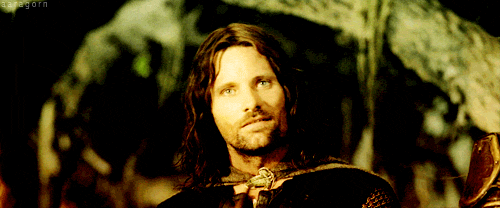
Hooded Stranger - Part 5
Gif source.
♕ ♕ ♕
Pairing: Aragorn x Reader
Rating: T
Chapter Word Count: 1050
Parts: [ < Previous Part ] [ Next Part > ] [ Masterlist ]
Full story: [ AO3 ]
♕ ♕ ♕
5. Village
Before leaving, Estel packed a few things, and donned his cloak to hide his bandaged leg and the crutches.
The village looked no more cheerful in daylight, and you felt a bit sorry for its inhabitants – who seemed to be almost exclusively male.
“Where are all women and children?” you asked.
“Further north, near the ruins of Fornost. This is only a ranger outpost,” he explained. “There are several places like this in the wildlands surrounding Bree and the Shire.”
“Weird that nobody knows about this,” you said. “Or do they, and I’m just ill informed?”
He chuckled, but then turned very serious. “We don’t advertise our presence; it’s not a good idea to draw the wrong people’s attention. There are evil powers at work in Middle-earth.”
You felt a chill trickle down your spine at his ominous tone. Seeing your expression, he added: “But there's still some good in this world, and it's worth fighting for.” The way he looked at you made you feel included in that ‘good’.
“There certainly is,” you agreed earnestly. Your eyes met.
He broke eye-contact first. “That building over there is the stables,” he said, a bit breathlessly.
When you entered it, you drew in the pleasant smell of horses and hay. They only had a few horses, and Estel explained they were mostly used for sending messages between the ranger settlements.
“Is it alright if we share a horse? Otherwise I must lead the spare one back afterwards, and it’s a bit cumbersome.”
“Of course.”
Despite his injury, Estel had no trouble mounting the large bay he had chosen. Reaching down to take your hand, he pulled you up to sit behind, and soon you were off at a canter.
A short way outside the outpost he stopped to remove his cloak, which was too warm for a summer ride. He gave it to you to sit on instead, since the saddle was only wide enough for one.
You bravely snuck your arms around his waist, pretending you needed it to remain seated, and leaned your head against his broad back. His stomach felt hard and flat under your palms.
On horseback, it only took a few hours to reach your home. When you neared it, you suddenly wanted the journey to last longer. You did not want Estel to go.
“How are you celebrating Midsummer Day?” you asked.
“Not much. Perhaps splitting a keg with the men. Why?”
“Well, now you had the trouble of riding all this way, perhaps I could invite you to our village feast? There will be plenty of food, dancing, games, all sort of things.”
To your surprise, Estel promptly accepted your offer. “That sounds fun!” Then he added: “But don’t tell them my name. Call me Thorongil.”
“What? How many names do you have?”
“Several. This is my alias. For safety.”
You shook your head amusedly, but agreed to do as told.
When you entered the main road, everyone stared at the horse, and even more so at the tall man in front of you. Your parents seemed a bit suspicious of your guest at first, but when you explained how you had helped him, and gave them the three silver coins, they instantly changed to become very friendly indeed.
He was even offered the only bedroom, forcing your parents to sleep with you and your younger siblings in the kitchen.
As much as you enjoyed being with your family after spending a year apart, you very soon got tired of their chattering and many questions, but Estel seemed not to mind at all. He answered everything readily, making up clever lies about who he was and why he had broken his leg. And thus both the evening and the morning after were spent amiably.
The next day was Midsummer, and the celebration lasted all evening. Estel could not join the dance or the games with his leg, of course, so neither did you. Instead you ate, and drank, and talked, and laughed, and had just about the best day of your life.
The more you got to know Estel, the better you liked him. He smiled almost constantly now, and was so handsome your chest contracted whenever your gaze fell on him – which was often.
In the evening, you did like many other couples, leaving the feast area to take a walk in the twilit summer night.
He took your hand, and it felt like the most natural thing in the world to walk hand in hand with him.
The sound of chirping crickets filled the air, and it smelled faintly of wild roses. Around you, the trees were covered in the fresh new greens of Midsummer.
"Did you enjoy your day?" you asked after a while.
“Much.”
“Me too.” Your eyes met, and this time neither of you looked away.
Estel cupped your cheek. “I should not do this,” he admitted, and closed the distance between you to press a kiss on your lips.
He was right, you should not do this either. You should not respond to his kiss so fervently, and certainly not let your hands slip around his waist and explore his back and shoulders. You were a decent, orderly person; not a flirt like some inn staff.
But right now you did not care about decency.
His lips tasted from the sweet fruit wine you had shared, and he smelled of pipeweed, and when your exploring fingers traveled under his shirt, his skin was warm and smooth. You loved all of it. He overwhelmed your senses.
As your kiss intensified, you felt his hands on your body too. Everywhere they went, your skin burned.
You paused to breathe. Estel’s face was flushed, and his eyes dark with want. Knowing that he could read the same emotions in you, you took his hand, pulling him down with you on the soft grass.
He spread his cloak, and you lay side by side, gazing deep into one another’s eyes. He kissed you again. In the heat of the moment, the surroundings faded, everything narrowing down to the two of you. Here, and now. Like you were alone in the world.
It was Midsummer; the longest night of the year, and you would make the most of it.
♕ ♕ ♕
Note: The next part is optional, and NSFW lol (pure smut).
Parts: [ < Previous Part ] [ Next Part > ] [ Masterlist ]
Full story: [ AO3 ]
#aragorn x reader#aragorn x you#aragorn#aragorn fanfiction#aragorn fanfic#strider#lotr#lotr fanfiction#fluff#Hooded Stranger
38 notes
·
View notes
Text










Black Sand Shores, CA (No. 2)
In 1886, Bixby partnered with William W. Post and they improved and realigned what became known as the Old Coast Road south to Post's ranch near Sycamore Canyon. At Bixby Creek Canyon, the road was necessarily built 11 miles (18 km) inland to circumvent the deep canyon. The road from Bixby Canyon climbed steep Cerro Hill and crossed the Little Sur River where its two forks diverted. The road entered the Cooper Ranch (formerly Rancho El Sur) and continued south about 7 miles (11 km) south to the Pfeiffer Ranch. In 1920, the 26 mi (42 km) trip from Carmel in a light spring wagon pulled by two horses could be completed in about 11 hours. A lumber wagon pulled by four horses could make the trip in 13 hours. Bixby obtained a patent on April 10, 1889 for 160 acres (65 ha) south of Mill Creek.
In 1891, visitor C. A. Canfield wrote about how a trip on the mail wagon from Monterey to Posts took most of a day, where he remained the night. The next day he rode horseback over the South Coast Road with Thomas B. Slate. They reached Slates Hot Springs at about 5pm. The single-lane road was closed in winter when it became impassable. Due to the steep and narrow road, even during the summer Coast residents would receive supplies via boat from Monterey or San Francisco. Due to the limited access, settlement was primarily concentrated near the Big Sur River and present-day Lucia, and individual settlements along a 25 miles (40 km) stretch of coast between the two. The northern and southern regions of the coast were isolated from one another.
In 1900, the country improved the road south to the forks of the Little Sur River. Charles Howland, who drove the mail stage between Monterey and Big Sur, built the Idlewild Hotel in about 1900 on the Old Coast Road where it crossed the Little Sur River. The Pfeiffer family's hospitality was enjoyed by friends and strangers alike for years. They finally began charging guests in 1910, naming it Pfeiffer's Ranch Resort. It and the Idlewild Hotel were the earliest places to stay.
Source: Wikipedia
#Black Sand Shores#California State Route 1#Highway 1#Pacific Coast Highway#National Scenic Byway#Big Sur#Pacific Ocean#travel#original photography#vacation#tourist attraction#landmark#landscape#seascape#countryside#street scene#road trip#summer 2022#California#West Coast#Big Sur Coast Highway#nature#flora#grass#tree#USA#blue sky#blue sea#beach#waves
4 notes
·
View notes
Text
"August 16, 2018
By Ryszard Kapuscinski
(An excerpt)
Herodotus — who lived 2,500 years ago and left us his “History” — was the first reporter. He is the father, master and forerunner of a genre –reportage. Where does reportage come from?
It has three sources, of which travel is the first. Not in the sense of a tourist trip or outing to get some rest. But travel as a hard, painstaking expedition of discovery that requires a decent preparation, careful planning and research in order to collect material out of talks, documents and your own observations on the spot. That’s just one of the methods Herodotus used to get to know the world. For years he would travel to the farthest corners of the world as the Greeks knew it. He went to Egypt and Libya, Persia and Babylon, the Black Sea and the Scythians of the north. In his times, the Earth was imagined to be a flat circle in the shape of a plate encircled by a great stream of water by the name of Oceanus. And it was Herodotus’ ambition to get to know that entire flat circle.
Herodotus, however, besides being the first reporter, was also the first globalist. Fully aware how many cultures there were on Earth, he was eager to get to know all of them. Why? The way he put it, you can learn your own culture best only by familiarizing yourself with others. For your culture will best reveal its depth, value and sense only when you find its mirror reflection in other cultures, as they shed the best and most penetrating light on your own.
(What did he accomplish with his comparative method of confrontation and mirror reflection? Well, Herodotus taught his countrymen modesty, tempered their self-conceit and hubris, the feeling of superiority and arrogance toward non-Greeks, toward all others. “You claim that the Greeks have created gods? Not at all. As a matter of fact, you’ve appropriated them from the Egyptians. You say your structures are magnificent? Yes, but the Persians have a far better system of communication and transportation.”
Thus Herodotus tried by means of his reportage to consolidate the most important message of Greek ethics: restraint, a sense of proportion and moderation.
Beside travel, another source of reportage is other people, those encountered on the road, and those we travel to meet in order to get them to convey their knowledge, tales and opinions to us. Here Herodotus turns out to be the master extraordinaire. Judging by what he writes, whom he meets and the way he talks to them, Herodotus comes across as a man open and full of good will toward others, making contact with strangers easily, curious about the world, investigative and hungry for knowledge. We can imagine the way he acted, talked, asked and listened. His attitude and bearing show what is essentially important to a reporter: respect for another man, his dignity and worth. He listens carefully to his heartbeat and the way thoughts cross his mind.
Herodotus notices the weakness of human memory, aware that his interlocutors relate different and often contradictory versions of the same event. Trying to be impartial and objective, he conscientiously leaves for us to decide about the most disparate variants and versions of the same story. Hence his reports are multidimensional, rich, vivid and palpable. Herodotus is a tireless reporter. He takes the trouble to go hundreds of miles by sea, on horseback or simply on foot only to hear another version of a past event. He wants to know, no matter the price he pays, and wants his knowledge be the most authentic, the closest to the truth. This conscientiousness sets a good example of the responsibility we assume, for all that we do.
The third source of reportage is the reporter’s homework: to read what has been written and endures in texts, inscriptions or graphic symbols on the topic a given reporter is working on. Herodotus also teaches us how to be investigative and careful. In his times, the amount of materials he could rely on was far smaller than that available today. So whatever he managed to collect was precious. He naturally was well read in Homer, Hesiod, poets and playwrights. He would decipher inscriptions on temples and town walls. Everything was important, potentially able to reveal a message or new meanings. By his own example Herodotus showed that a reporter should be a careful observer, sensitive to details seemingly insignificant and banal, which may turn out to be symbols or signs of worlds much more important, stretching farther out, and of higher order.
“All people have a natural tendency to acquire knowledge,” runs the sentence with which Aristotle, a little younger than Herodotus, begins his “Metaphysics,” adding that it is the eye that plays the most important role, because it perceives differences best. We also know the importance of the eye of the reporter, focused, penetrating, noticing what seems invisible, which may be the other face of a given phenomenon, often the most essential.
However, the snag is that to notice what is the most essential, you often have to be on the spot. And to get there, you have to take a trip, to travel. And out of those travels, his presence on the spot resulted in Herodotus’ great reportage about the world that we have been reading for 25 centuries.
Reportage is created out of what Aristotle called “tendency to acquire knowledge.” And in this human desire, a reporter’s passion meets the expectations of his readers, listeners and spectators. A reporter, driven by the “tendency to acquire knowledge,” tries to meet halfway the curiosity about the world of his readers, their own “tendency to acquire knowledge.”
And here is why good reportage is so popular in the contemporary world. The contemporary man, living in the world conjured up by the media of illusions and appearances, simulacra and fables, feeling instinctively that he is fed untruth, hypocrisy, falsehood, and virtual manipulation, seeks something that has the power of truth and reality, things authentic, that is.
I see that during my meetings with readers. When I tell about one of my reporter’s adventures, someone is likely to interrupt me with the question: “Is that authentic?” I assure the person that I have really been there. And then a wave of relief rolls across the audience and a friendly atmosphere sets in. Why, they’re taking part in something real, since someone who has witnessed the event is actually standing right in front of them.
What is a literary reportage, then? How to define and describe it? It’s not an easy matter, as we are living at the moment of “blurred genres,” a new species.
Working in the countries of the Third World, as a correspondent of a press agency for quite a long time, I had this unsatisfied feeling resulting from the paucity of the language of press information when confronting the rich, full-of-variety, colorful, often hard-to-define reality of those cultures, customs or beliefs. The everyday language of information that we use in the media is very poor, stereotypical and formulaic. For this reason huge areas of reality we deal with are beyond the sphere of description, which the formulaic message is unable to convey. So what is the way out of this cul-de-sac of unsatisfied feelings and frustration? I availed myself of the suggestion of such writers as Truman Capote, Norman Mailer and Gabriel Garcia Marquez, whose writing straddles the border of fiction and press chronicle. They introduced the term “New Journalism”, “nuevo periodismo.” By this term they meant the kind of writing in which authentic events, true stories and accidents are described with language containing the writer’s personal opinions and reactions and often fictional asides as added color; with the techniques and manners of fiction, that is. So this creative and enriched combination of two different manners and techniques of communicating and describing make up a literary reportage.
This has turned out to be a happy and seminal “blurring of genres,” especially in the light of the progress in science and technology, which has enriched and incredibly differentiated the picture of the world, ever more difficult to describe with language.
I saw it for myself writing “The Shadow of the Sun” (Afrikanishes Fieber). How to describe a jungle with the language of press information? This is downright impossible unless you reach for the treasury of belles-lettres, for its rich variety of expression. On the other hand, today, literature avails itself continuously of reportage production. Notice how many reporters are characters of fiction, how many descriptions are typically in the reporter’s vein among classically fictitious fragments and dialogues!
In this multicultural world, people from those other cultures demand that they be treated as equal, command the same respect and be in our good graces. It is a well-established given that there are no higher or lower cultures and what makes a difference is just the result of their specific geographical and historical conditions.
The problem is that we know little about other cultures, and rather than decent knowledge we are likely to make do with easy and false stereotypes. This is what Herodotus understood all too well. Better still, he knew that only mutual knowledge of each other makes understanding and connecting possible, as the only way to peace and harmony, cooperation and exchange. With this assumption in mind, a reporter takes a plunge into the hive of activity: travels, investigates, takes notes, explains why others behave differently from us and shows that those other ways of existence and understanding of the world have a logic of their own, are sensible and should be accepted rather than generate aggression and war.
So it’s plain to see what responsibility lies with our work, reportage. Plying our trade, we are not just men or women of writing pursuits, but also some kind of missionaries, translators and messengers. We do not translate from one text into another, but from one culture into another in order to make them mutually better understood and thereby closer."
From the site of the American travel writer and essayist Rolf Potts (https://rolfpotts.com/ ).

Ryszard Kapuściński (Polish: [ˈrɨʂart kapuɕˈt͡ɕij̃skʲi]i; 4 March 1932 – 23 January 2007) was a Polish journalist, photographer, poet and author (see https://en.wikipedia.org/wiki/Ryszard_Kapu%C5%9Bci%C5%84ski).th
2 notes
·
View notes
Text
"Okay, but where's the Phangs fic about Vlad in high heels."
Nice try, but I'm already writing one Hunger Pangs fic because of you gremlins. Go entertain yourselves :P
(Also, let's not pretend like Vlad is any stranger to heels. He's the grandson of a warlord who used to go into battle on horseback. Your boy can absolutely work a stiletto--both the footwear and the knife.)
Anyway, if you're really into Vlad getting dressed up like the pretty, pretty slut vampire he is, there's the (updated) "Brought to Heel" fic on my Ao3.
Consider it canon-compliant. And heed the tags at the source.
#I know you know I'm weak for fic prompts of my own work#but I am going to be strong on this one#it's bad enough that Sugar Vladdy is novel-length as it is :P
539 notes
·
View notes
Text
Christabel is a long narrative ballad by Samuel Taylor Coleridge, in two parts.
[...]
The story of Christabel concerns a central female character of the same name and her encounter with a stranger called Geraldine, who claims to have been abducted from her home by a band of rough men.
Christabel goes into the woods to pray by the large oak tree, where she hears a strange noise. Upon looking behind the tree, she finds Geraldine who says that she had been abducted from her home by men on horseback. Christabel pities her and takes her home with her. However, supernatural signs (a dog angrily moaning despite being asleep, fading flames on torches suddenly reigniting, Geraldine being unable to cross an iron gate, denial of prayer) seem to indicate that all is not well. They spend the night together, but while Geraldine undresses, she shows a terrible but undefined mark: "Behold! her bosom and half her side— / A sight to dream of, not to tell! / And she is to sleep by Christabel" (246–48).
[...]
The transgressive plot of Christabel revolves around the relationship, implicitly sexual, of Geraldine and Christabel. Geraldine, takes on a proto-vampiric role, with all the antecedent features that that necessitates: external beauty, a revelatory bodily mark, and a physical encounter (with the victim) that leaves them incapacitated
(source)
So have we talked about this because this punched me in the face out of nowhere and I always thought there was Something going on with Cristabel’s name... the Christ component of the name is of course the obvious connection but now it’s also a lesbian vampires reference??? Hello???
Bonus: “Christabel was an influence on Edgar Allan Poe, particularly his poem "The Sleeper" (1831).”
22 notes
·
View notes
Text
The Guardian


A/N: Bear with me on this one friends. This came to me suddenly and I decided to write it out before my creative juices leave me. I haven’t watched the show completely but I’m in the middle of the book. This will be set in the same universe but of course, I’ll tweak some things here and there. Enjoy!
Pairing: The Darkling x f!reader
Warnings: Mention of death
Summary: The darkling has been around for centuries but he’s never seen anything quite like you. He’s been there all your life yet he was still a stranger. He watches you from the shadows...waiting. He wanted you to have a normal life knowing that eventually you’ll be hunted once you get older. You’re his grace and him your guardian.
There was no need for the Darkling to trouble himself with tedious tasks, especially one that dealt with one of his personal guards’ absence from his duty but he had nothing better to do than to check himself.
Without any personal guards accompanying him he rode on horseback to the guard in question. The man and his wife did not live in the Little Palace like the others but chose to stay in a secluded area that was more domestic than anything.
Placing three firm knocks on the door, Desmond, the guard answered. His eyes widened in surprise not having to expect the Darkling to come to his home.
“General. What do I owe the pleasure?”
The Darkling scrutinized the man noting the dark bags under his eyes.
“Your absence has been noted. The king believes you to be defiant but rest assured I spoke to him that you are of my guard ship.”
Desmond let out a relieved sigh. He was still at the entrance of the door but made no move to let his master in. This didn’t go unnoticed by the Darkling who’s dark eyes briefly squinted at the man. Once Desmond felt the underlying quietness in the air, he looked into his master’s eyes before quickly looking away.
“M-my wife and I just had our baby. A baby girl,” he chuckled wholeheartedly. His smile faltered when the Darkling didn’t give any hint of emotion at it. “She is unwell so we’re looking after her until she gets better.”
“There are healers at the Little Palace. I’m sure your daughter will be well cared for but until then you and your wife have your duties.”
Desmond shook his head reluctant to let the matter go.
“But-”
He held up his hand for him to stop speaking.
“Be ready tomorrow-without delay.”
The Darkling turned his back and proceeded to walk away until he stopped completely at the sound of a baby crying from inside the house. His whole body went rigid. He was stumped for a reason unknown to him. He shook himself out of his thoughts and took a couple of more steps only to pause again.
There was a certain uneasiness he felt. Every step he took away became heavier than the last. It seemed as if a great weight was wrapped around his ankles stopping him from leaving.
He briefly checked over his shoulder but nothing was out of the sort. There was no threat, just a family settled in their home.
Nonetheless, there was a nagging feeling to check the house. Drawing him back to where he once was. He ushered to his horse grabbing the reigns.
He told himself not to look back, to fight the feeling. There was nothing there but a family, he reassured himself once more. He fisted his hands around the reigns then grunted as he dropped them altogether.
He looked up into the window upstairs and saw a glimmer of light. It wasn’t strong but it was indeed a source of light. He took slow steps forward entranced by the small light appearing from the upstairs window.
The light died and he shook himself out of his trance. He did not mistake this. He saw it and felt the small-scale energy from even outside the vicinity.
As far as he was concerned Desmond was a Squaller and his wife an Inferni. It was impossible for them to make such a glimmer of hope appear-unless they were hiding something.
The Darkling pounded at the door. Each hit harder than the last. Desmond opened it only to be pushed back as his master forced his way in immediately going up the stairs.
He drowned out the shouts trying to stop him. His steps faltered when he reached the outside of the room. He reached out to the door but was stopped by a feminine voice.
“My lord please, that is our daughter’s room.” Desmond’s wife pulled at her kefta in an obvious nervous manner.
He returned his attention to the door and ignored their pleas. Once he opened the door completely he saw that it was just as they said. It was their daughter’s room.
He walked in checking every corner to see where that light could’ve possibly come from. When he had just about given up his search, he turned around, stunned. A small stuffed animal was hovering in the air in front of his face. He took it in his hands then turned his attention to the other toys in the room floating in the air.
He looked at the two parents in the doorway both looking nervous under his watchful eyes. Then suddenly, the baby sneezed and all the items fell in the blink of an eye.
The Darkling took an intake of breath. It was the little baby who had wielded the power of a Grisha. He had felt an energy radiating in here but he did not think it would be from such a little thing as her. He took cautious steps to the baby’s crib looking down at the innocent figure looking up at him. He brushed his finger over her soft cheek.
“Bless you, my dear.”
There was a collective silence in the room. No one moved or talked beside the little baby moving here and there.
“She possesses the same abilities as us, my lord.”
“So she’s a Grisha. One far too young to be intuned with matter already. She’s just a baby.”
He continued to stare at the little thing in the crib as if trying to make sense of it all.
“No, my lord, forgive me. What I meant was that she has the abilities of both a Squaller and Inferni.”
The Darkling looked at him sharply. His brows were strewn together and his eyes hard.
“That’s unheard of.”
“It’s true my lord,” Desmond’s wife spoke aloud. “We didn’t quite believe it ourselves. We thought we were going mad but she kept doing it. Using both powers. Then she got unbelievably sick. That’s why we’ve been absent from our duties but now after that, she looks better.”
“How is she able to conjure light?”
“Perhaps it was a small flame,” they tried reassuring.
“No. This was light. Not one of a flame but actual light. She did it somehow, I’m sure of it. I intend on finding out if she can do it again.”
“All we ask is you don’t take her from us. We’ve tried so hard for a baby and she’s our little miracle.”
The Darkling peered down at the little baby. She stared up at him with a blank expression with an occasional kick of her legs and clenching of her hands.
The Darkling smiled. Smiled so bright that Desmond and his wife became startled at the very sight. His smile then faltered at what he was about to say next.
“You know she’ll always be in grave danger. If that light had been any brighter or stronger, she’d be hunted at this very second but alas she’s just a babe. She knows not of her abilities quite yet.”
“We’ll protect her.”
The Darkling looked at the child’s mother and father seeing them pull each other in firm acknowledgment. He didn’t doubt they’d protect her with their lives.
A parent’s determination to protect their child held no bounds but he worried what the Shadow Fold would conjure up. Everything unworldly always seemed to be summoned when a powerful being that posed a threat to their existence. Power for the price paid in blood.
“Stay with your daughter and tell no one else about her. I’ll come with news if there are any dangers near. Just keep her safe until I can come up with something better to protect her.”
“Thank you, my lord. Thank you.”
“There’s no need to thank me. She’s under my protection.”
The Darkling nodded his head to the two parents then looked down at the little baby one last time. She was going to make a difference in the world.
****
For weeks it had been quiet. No news of any deaths from the crossing on sandskiffs. The creatures within the Shadow Fold seemed to be absent.
The news of bringing in critical supplies enlightened the king but made the Darkling uneasy.
Nothing crossed into the Unsea without a few setbacks. Every time he closed his eyes he could feel the darkness just waiting. They were on a standstill and for what? He knew nothing good would come from this.
“My lord! Something came from the Fold. Four or five of these creatures.”
The Darkling opened his eyes exhaling at complete ease. Just as he expected. The peace never lasted.
“How many casualties?”
“That’s the thing, my lord. They’re none to report. Seems like they’re looking for something.”
“You’re telling me the Volcra’s simply entered without attacking anyone?”
He cocked his head at the man seeing him just as perplexed.
“It’s not the Volcra that came through. From the books in the library, they match what is called a Skuldra. Uhh, they’re wingless part skeletal versions of Volcra. For them to pass through the Fold takes time and energy. These things practically tear themselves apart just to get through and start their hunt.”
He narrowed his brows confused. He leaned forward with great interest.
“Hunt? What exactly are they hunting?” He asked in a voice that was low but firm.
“Something that’s a threat to their very existence.”
The Darklings eyes intensified. It seemed that the darkness had already found her.
“All of you with me.”
The ride had seemed like a long trip but it was one not too far off. When they arrived the once humbled home was in shambles. Half of the creatures were dead but two more remained. One on top of the roof and the other digging in the dirt.
Both of the creatures turned, feeling the presence of the Darkling. They gave out an ear-piercing shriek. With his palm raised, he was able to hold the creatures in place with great concentration.
In those critical seconds, they were able to kill them with ease. He exhaled feeling the power within the creatures before the pressure from his chest was released.
“Search the house.”
He circled the area seeing that a fight indeed was en suite before they even arrived. He followed the blood trail and burn marks to two bodies. He knelt down and sighed heavily, they gave their lives to protect their daughter from these creatures.
He took the necklace from around Desmond’s neck then the ring off of his wife. They’d be reminders for the child when she gets older.
The wail from the baby distracted him. He stood up quickly trudging towards the man who held her in his arms, not knowing he was holding the future in his hands.
“Give her to me,” he grounded out. They didn’t know what she was capable of but he didn’t trust anyone else with her.
“Shall we give her to a peasant family?”
The Darkling thought for a moment as he looked down at the innocent baby in his arms who had tears running down her cheeks. He wanted her to be at the Little Palace with him.
As much as he wanted to shield her away from the world, he couldn’t. He felt the connection between them. Felt calm even. She could feel it too, ceasing her cries and drifting off to sleep.
He continued to contemplate the best decision. In order to keep her safe, he needed to go against what he felt. Be apart from her even when her power called to him just as he did hers.
He didn’t understand her power yet. She had the powers of both her parents but could conjure light somehow.
“Ask around. She’s to be given to a family that has no other children and is trustworthy. A family capable of providing food for her. A good stable humble home as her true parents intended.”
Whoever had her under their care, he wanted them to provide the best attention a parent could offer. She needed to be loved and raised without the luxury of the Grisha. He wanted her to live as a lively child and that wouldn’t be possible if he took her with him.
#The Darkling#Kirigan#General Kirigan#the black heretic#Aleksander#Aleksander Kirigan#The Darkling x reader#General Kirigan x reader#Aleksander Kirigan x reader#Shadow and Bone
253 notes
·
View notes
Text
I wanted to talk about Andy and guilt. It's something that plagues her through the movie. I wanted to examine why, and how she is so strong to keep going regardless.
After the kill floor, Andy snaps at Nicky and says, What did it get us? The world isn't getting better. I think she feels a great amount of responsibility for that fact, after seeing the world through such a long range of time. She has worked to due good throughout her immortality and she feels like nothing has actually changed. Luckily, she sees Copley's board at the end and understands the scope of the change she and the rest of her immortal family has achieved.
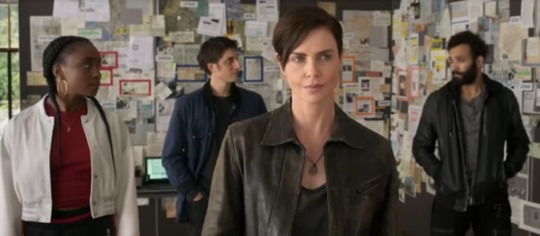
Going to Lykon, if you've seen the timeline video of The Old Guard of Netflix, you'll have seen a maybe 3 second clip of Andy riding up to Lykon on horseback before a battle. She says, "Watch your back." He grins at her and says, "That's your job, Andromache."
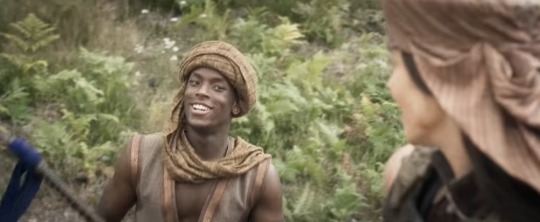
And then. Well. We know what happens.
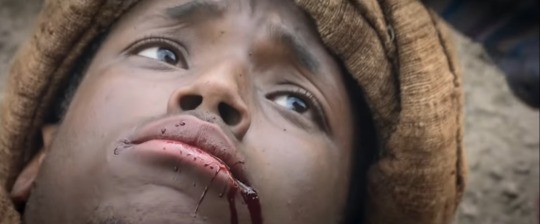
I wonder, does Andy feel guilt at the fact he got that final wound? They didn't know their immortality was finite, but still, she cautioned him to watch his back. Did he get injured because she wasn't there to watch it herself? I think that would tear her up inside.
And now for the big source of guilt: Quynh. Whether you view them as bff's, gf's, or wives (I'm partial to the last one myself), she is devasted when Quynh is put in the iron maiden.
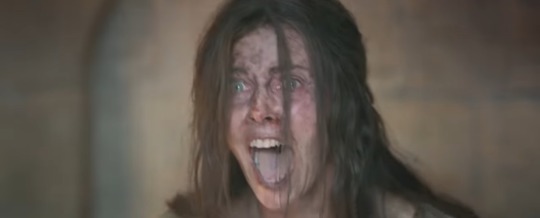
She eventually chooses to stop looking too, leaving Quynh down at the bottom of the ocean. I'm sure that wasn't an easy decision, and very much another huge source of guilt for her.
Then there's Booker. I have a tag for the two of them, the tired ones. They are both so tired. Sometimes, being around like minded people when going thru a bad situation can be a comfort. They understand. Other times, it is a snake eating its tail and spiraling into worse mentalities cause ones person's shit vibes too much with the other person's shit and then suddenly things have spiraled out of control. But I think Andy acknowledges the fact that they have both been stewing in guilt and depression when she says, "We've been doing a shit job of [living]."

And, most importantly, she says, "Now get up."
It ties into the overall idea that living is hard and it comes with struggles and after 6,000 years of not only her own struggles, but taking on humanity's struggles, of COURSE Andy feels guilt. Of COURSE she is tired.
But! She still smiles at her family.
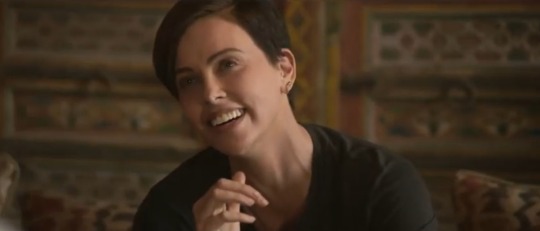
She still takes the words of a complete, caring stranger to heart.
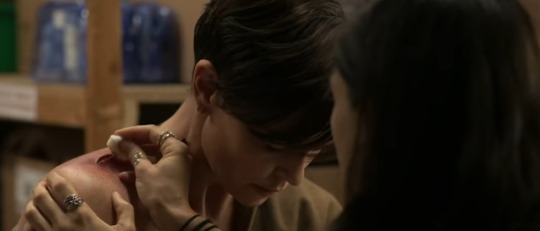
She sees the vitality and strength in Nile and sees who she used to be, before she was so tired.
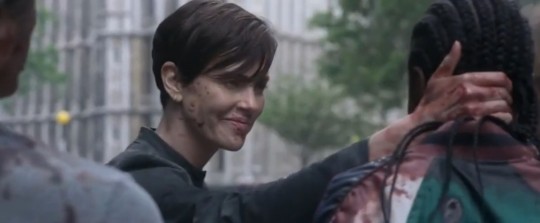
While I've seen quotes saying Nicky is the heart of the team, and we saw Nile joke about Booker being the brains, I'd like to put out there that Andy is the team's spine. She holds them up. Bends without breaking. Carries the weight of the world on her back and continues on.
TL;DR: Andromache the Scythian has been through a lot and is still kind and persevering af.
(All photos are screenshots from videos on YouTube, can link videos if needed.)
#i'm feeling a lot of emotions about andy tonight guys#andromache the scythian#andy#the old guard#long post
811 notes
·
View notes
Text
[After water's thrown in his face.]
Daffy: Thanks, it's a hot day.
Yosemite Sam: Ah don't like what you said!
Daffy: I sthaid it was a hot day.
Sam: Well, ah don't like the way ya said it!
0 notes
Note
📚👀✨
Okay so I'm going to give you the rundown on the fic I most lament not writing. I came up with this concept at around the same time I started writing Sins of Our Flesh, and I decided that I had to scrap one of them to focus on the other completely. This is the fic that got put on the chopping block.
I really, really wanted to write a vampire AU. Like, so badly. The concept was this: Nene was betrothed to the young duke Minamoto Kou, and was living with his family prior to their marriage. They were kind, but secretive, and often gone for hours at a time doing lord knows what. I'll let you in on what she doesn't know, which is that they're vampire hunters. They're specifically trying to find proof against (and a strategy against) a wealthy, powerful, reclusive nobleman whom they believe to be a vampire: Lord Yugi.
One day, when Nene is on a walk about the grounds, she is nearly run over by a rider on horseback. Despite the fact that he is alone and riding himself (rather than in a carraige), this man is clearly noble, with finer clothes and jewels than she's ever seen (and Nene isn't poor by any means). By way of apology, he gives her a ride back to the Minamoto's estates, even going so far as to wrap her up in his black, fur-line cloak, since she'd had to dive into a snowbank to avoid him. There's a very ~saucy~ scene of them riding together and her blushing over the proximity to this handsome and mysterious stranger.
He brings her back to the Minamotos, and she picks up right away that they are acting strangely. They don't invite him in, barely thank him for bringing her back, and its very clear that Kou is angling himself so that this mysterious stranger can't see her behind him. After he leaves, Nene asks for an explanation, but she's brushed off with excuses.
After this point, they begin receiving invitations (her and Kou, not the whole family). They come again and again, grander and more generous each time, often accompanied by gifts of "apology" to his poor new friend Lady Yashiro. These are a source of tension amongst the Minamoto family, for reasons Nene still can't figure out. Kou is insistent that he keep Nene far away, while his family sees this as their best opportunity to get a vampire hunter into Lord Yugi's castle. Eventually, he succumbs to the pressure, and they accept one of Lord Yugi's invitations.
They come the night of a ball, and Nene is seduced. She gets carried away with the wine and dancing and his fine words, and next thing they know, Lord Yugi and Lady Yashiro have been discovered together in a compromising position by other guests. Her betrothal to Kou is broken off, and she finds herself in a hasty engagement to Lord Yugi. Despite the circumstances, and the damage it inflicts to his reputation, Kou comes repeatedly to try to convince Nene to leave him, to convince her that he can still marry her and protect her honor, but Nene is both a) increasingly in love with her new fiance, and b) unwilling to trap Kou in a loveless marriage that will damage both his reputation and hopes of finding happiness.
Once she's married to Hanako, it's basically game over. She is growing ill and weak. Unbeknownst to her, her husband is drinking her blood while she sleeps. But there was going to be another saucy scene in which she woke up during it, was kinda *ahem* intoxicated by the feeling, she ends up drinking his blood and becoming a vampire, and it was all going to end with her first dramatic meeting with the Minamotos at a ball following her transformation. Great stuff. But I liked The Sins of Our Flesh better, so an idea it must remain.
#thanks for asking!#I don't remember how I've been tagging asks#jshk#tbhk#hanako#yashiro nene#minamoto kou#hananene#vampire au#fic#my fic#bleh
22 notes
·
View notes
Text
Our Blind Contributor - Alice King
I recently got a hold of a copy of the June 11th, 1887 edition of "The Girl's Own Paper", a British paper for women and girls published from 1880 to 1956.
There are a number of interesting articles in this issue, but the one that stood out to me the most was the autobiographical account of Alice King's life, a completely blind author, equestrian, and teacher from England.

(Click for better resolution. Image ID provided using Tumblr's image description system. Image sourced from https://www.victorianvoices.net/topics/people/disabled.shtml).
I am not exaggerating when I say this woman was awesome. As a disabled woman myself, this is the sort of person I wish we had learned about in school. Among other things, she could speak eight languages, published her first book at twenty, was an excellent horseback rider, learned knitting and macramé lace, ran a Bible Class with nearly 70 members, and modified her own typewriter and watch to suit her disability.
In this, as in everything throughout my life, the grand secret of my success has been unwearying, patient perseverance. I can confidently tell all those who are suffering under any physical disability, that if they will take this weapon—patient perseverance—in band, and use it resolutely to carve their road, they will succeed.
The full article is under the cut - it's long, but I highly recommend it.
The article, transcribed by me, so apologies if there are any errors:
"THE GIRL'S OWN PAPER [PRICE ONE PENNY. VOL. VILL-No. 389.] JUNE 11, 1887. OUR BLIND CONTRIBUTOR-ALICE KING. WRITTEN BY HERSELF.
THE few words that I am going to say in this paper about myself are intended to be partly a comfort to those who have dear relations and friends that have lost their sight, and who are sorrowing over what they deem an irremediable affliction for those they love, and partly as an encouragement for those who are themselves blind, or who are burdened with any other infirmity which seems to make hopeless their chance of getting forward in the race of life. If I can succeed in either of these points I shall indeed be happy and thankful.
I was not born blind, but my sight was always so very imperfect that it scarcely de served the name of sight at all. I could distinguish no object clearly, not even when of places placed close to my eyes, so that all my descriptions of places and scenery in my writings can in no way have originated from any dim, scattered memories of those early days. When I was about seven my little glimmer of sight became darkened entirely, and since then I have been completely blind.
But though I am blind, it often gives me a sort of surprised feeling to hear myself talked of as such; I have such a keen, intense consciousness of knowing all about, and seeing, everyone and everything around me. When strangers speak to me for the first time, I at once create, from their voice, a distinct picture of what they are like. When I am driving or walking through a beautiful country, the sound of waving trees and murmuring water instantly brings me a vision of wondrous picturesqueness. When I enter a room I have never been in before, I quickly know all about its size and the way in which the furniture in it is placed by listening to such sounds as the closing of a door or window or the moving of a chair or sofa. Another thing which makes me never able to realise that I am blind is that I have always a brilliant light before my eyes, so that seem to myself continually wrapped round with a radiant cloud. Into this light I can call up at will any colour that I think of intently for a few moments, so that frequently I am gazing into a gorgeous red or green incandescent mass, that appears to be scintillating close to me and glowing like a living fire.
God in His love and mercy has also given me other abnormal faculties, which take the place of, and in some cases almost more than take the place of, sight. I can frequently tell when someone is in a distant part of the house by certain peculiarities, which my ear recognises, in their way of closing a door or performing some other insignificant but audible act. I have my especial manner of distinguishing my friends before they speak, when they enter the room, by the sound of their breathing or the fashion in which they move about. I can always tell when anyone is looking at me with peculiar feelings of interest, or affection, or dislike; I have a kind of indescribable burning sensation that pervades my whole frame. I can sometimes tell, when I am holding a person's hand, what is passing in their mind. This latter faculty has, under God, occasionally been of inestimable help to me in dealing with the working men and lads, of my work among whom I shall speak by-and-by. It increases in no small degree my influence over a man when he finds that I know of a wavering resolve for good or a secret thought of sin that is lurking in his heart.
I have also at times certain intuitions which make me able to foresee coming events. This power is, however, most capricious in its coming and going, and I have not myself the slightest control over it; I can never by my own will bring it to bear on any point that I wish; but it will often give me a prescient flash of light about some circumstance which is of comparatively little to me. I can give no account of its origin, and cannot define its exact way of working in my mind.
As a child I received no education especially suited and intended for the blind. I was entirely educated by my mother, a woman of great intellectual ability. She taught me much as other children are taught, except that she did her utmost to strengthen my memory by making me learn a great deal of poetry by heart. She gave me a correct knowledge of geography, which has remained with me all my life, without the help of any raised maps, such as are now used in blind schools, simply by making me describe in words the shape of each country, or island, or lake, and the position of each province with respect to another. I learned geography so thoroughly in this that in my schoolroom days I could have told any other girl how to draw a map of any country with the utmost accuracy.
I have learned seven languages through my ears—French, German, Italian, Spanish, Hebrew, Greek, and Latin. I can hardly tell how I acquired them. I first learned the grammar by heart with my mother and sister, who were always, one or the other of them, my fellow-students, and then the faculty of understanding the different languages came with more or less facility. My practised, delicate sense of hearing has, no doubt, rendered me peculiarly quick in catching the pronunciation of foreign tongues, and this may have made the acquirement of them easier to me than it otherwise would have been.
As a child I was peculiarly bold and fearless; indeed, my blindness seemed to make me braver than others of my age. I grew to know any new house I was to with remarkable quickness, because I needed no light. I learned to ride on horseback, and was a bold horsewoman, sitting in my saddle with as much ease and confidence as if I was in an armchair. The roads over the hills of West Somerset, in the neighbourhood of Exmoor, where I was born, are such as would make most riders, however practised, feel very much more inclined to trust to their own legs than to those of their horse; yet up and down these steep ways, which are often nothing better than cataracts of rolling stones, I used to ride, feeling quite as happy as a young lady sauntering about on velvet turf in a sunny garden. I had a real affection for the animals on which I rode. Beautiful creatures they were, half-bred between horse and Exmoor pony, and endowed with wondrous intelligence. They fully returned my regard, and understood quite well that they had to take more care of me than of any other rider.
I can do work of many kinds with great case and much pleasure. My power of feeling lies chiefly in the forefinger and the thumb, the skin and muscles of which have been trained to great delicacy of touch. I can knit the finest silk, can do canvas-work, and have lately been acquiring skill in macramé lace. I have not learned these different sorts of work in a moment, but have gained my proficiency in them with incessant practice and resolute determination not to fail. In this, as in everything throughout my life, the grand secret of my success has been unwearying, patient perseverance. I can confidently tell all those who are suffering under any physical disability, that if they will take this weapon—patient perseverance—in band, and use it resolutely to carve their road, they will succeed.
My capacity for writing began to develop at a very early age, and broke out into little ripples of verse almost as soon as I could speak. It seemed to come naturally to me, like a song to a young thrush. My first appearance in print was in a volume of sacred poems entitled "The Lays of Palestine," which was brought out by my father, and in which were put two hymns written by me before I was twelve years old.
My first book, "Forest-Keep," was written when I was about twenty. I have been often asked how it is that, without ever having seen a tree or a green field, or looked into the face of man or woman or child, I can describe vividly scenery, or beauty of feature, or expression in a human countenance. I can only reply that every description I write tells exactly what I see with visionary eyes. The moment I try with real, earnest intensity of imagination and thought to get a distinct idea of anything I want to paint in words, I see the scene or the face clearly before me, and then I write down what I have seen. This process requires no great mental effort; it came naturally to me, quite uncalled for, the moment I began to write.
I have learned how write English fluently, partly through my parents, from my earliest days, reading out loud to me all the masterpieces of English literature. I have continued this practice of listening to well-written books all my life, and my ears have helped me in catching a good style of composition. When I was a child, my father, who at that period was translating into English verse the "Æneid" of Virgil, used to tell me the meaning of a Latin line or two in simple English words, and then bid me turn it into poetry. This mental exercise no doubt helped me in after years to find command of language easy.
In the first years of my literary career I always wrote with an amanuensis. She was generally a a girl from the village school, with a mind not too well instructed as to grammar and orthography. I used to have to write out every sentence first thoroughly in my head, getting up thus, perhaps, half a chapter by heart, and considering well how each paragraph sounded, and how any specially long words were spelt; then I act to work with my amanuensis to get it all on to paper; and laborious the task often was for both her and myself. Here again, however, patience and perseverance stood me in good steal.
At length came the, for me, happy days when that wonderful and beautiful machine, the type-writer, was brought to England from America. I resolved, the moment I heard of it, that I would learn it and make it useful in my literary work. I had two changes made in the machine to suit my blindness; one was having the letters, etc., carved upon the keys, the other was having every tenth degree marked at the top in a way that I could feel. Before, however, I could make carved letters useful to me, I had to learn what letters were like; this I did by feeling constantly round and round the letters upon the edge of a little tin plate. Yet with all the various helps which I devised to make the type-writer acquirable by me, it seemed to me, at first, that it would be simply a matter of impossibility that I could ever learn to write with it. I well recollect the heart-sinking with which I used to sit down at the machine: even when I had been labouring at it for four hours, till every muscle in my arms and shoulders ached, I got up feeling that I had made no way at all. Now I can write with the type-writer quicker than most people with the pen, and it is one of the blessings and comforts of my life. There is now no need for elaborate preparation beforehand when I write, for my thoughts flash in a moment from my brain on to the key-board.
The other great work of my life, which God has put it into my hands to do, besides my literary work, is that of teaching and influencing working men and boys. The parish of Cutcombe, where I was born, and where my father is clergyman, is a large, straggling, hill-country village, very much out of the world, and very old-fashioned, at the time of which I am writing, in all its ideas. The men and lads of the place had had few softening, up-lifting influences at work among them, and the evil spirit of drink was walking abroad in great power and strength through the midst of them, as it done throughout West Somerset. When I first opened my Bible class, almost all the men fought very shy of it and of me; they had never heard of such a thing as a lady busying herself about, and interesting herself in, working men and their belongings, and my first class had some four or five members, who seemed a little ashamed of what they were doing, even when they came in to take the word of God in their hands and hear about it. The prejudice against the Bible class, how ever, passed gradually away as Sunday after Sunday I persevered in it, and my numbers soon were doubled, while the Bible class began to be acknowledged as a power for good in the parish.
Now my Bible class counts some seventy members of all ages, from grandfathers of threescore years and ten, to bright lads just entering their teens; and everyone of these is, under God, more or less subject to my influence. The men will do more at my voice than at any voice in the world, and my blindness only seems one power the more to make them regard my womanhood with chivalrous reverence; it wakens up all the tender chords deep down under their rough exteriors. They will confess everything to me, and let me lead them almost anywhere. I keep up my influence over them by often having short private interviews with each man alone, besides meeting them at the Bible class.
The Bible class is not the only thing established for my working men and lads. I have started for them a reading-room, in which they have all kinds of papers, books, and games; a temperance refreshment room, and a brass band. I have also grounded in the village flourishing branches of the Church Temperance and Church Purity Societies. But yet more than for anything else that God has let me do among my men do I rejoice with thanksgiving over the Sabbath mornings, when the members of the Bible class come thronging up to the Table of the Lord.
My vast amount of work of different kinds makes it very necessary for me to economise my time, therefore nothing was more wanted by me than a watch, and I set about thinking how I could have one made that I could feel. Opposite each figure on the dial-plate I had a little knob placed; the hour-hand also had a tiny excrescence put upon it; the minute hand was made very thick, and screwed so high that it would pass over the knobs without catching, and thus I had a watch by which I could tell the time to a minute. I have described my watch thus minutely, that my plan may be useful to others with darkened or failing sight.
I am no proficient in music, but listening to it is one of my greatest pleasures; indeed, those with sight have probably no conception of what all sweet sounds, such as the melody of the wind, or the chime of the waves, are to those whose sense of hearing has been refined by blindness. I delight in walking through a picture gallery, and in having the pictures described to me. I take great interest in all natural history, and am never tired of tracing out with my fingers the delicate formation of a flower, or a leaf, or an insect's wing, if either of these is put into my hand.
Thus it will be seen that there are few things from which my blindness shuts me out; and that God's love, though it has closed for me one window, has opened for me many others."
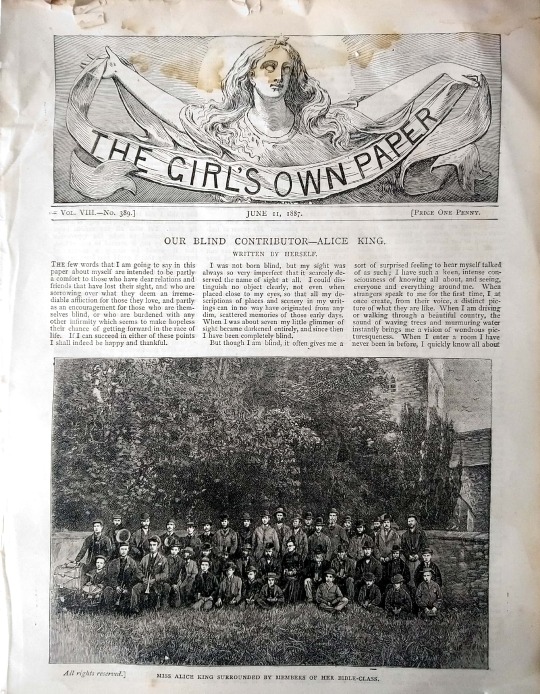
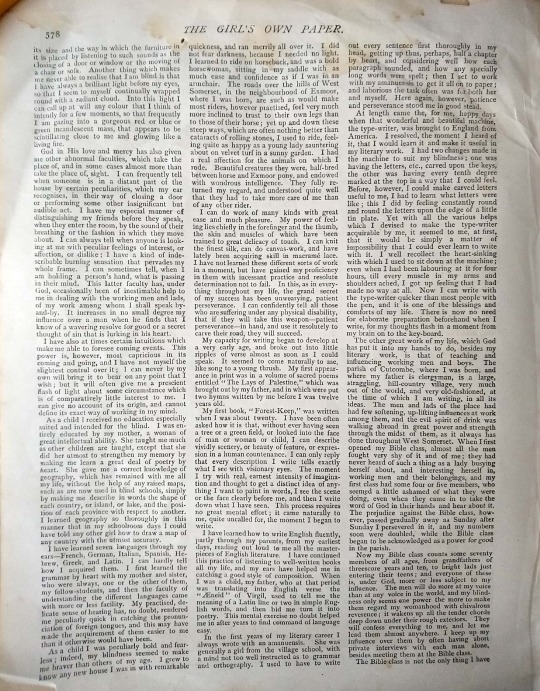

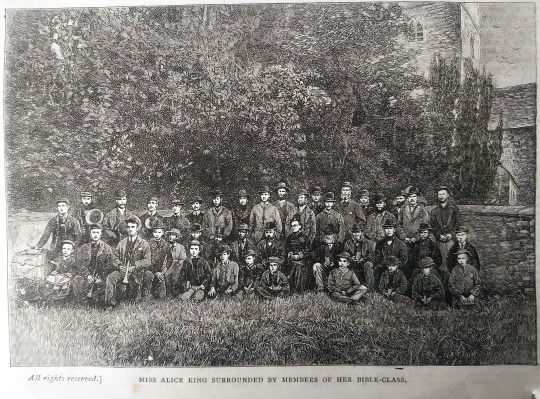
(Here are the photos of the physical article, click for better resolution. Image ID provided using Tumblr's image description system.)
I also found a second article from 1885, from which I sourced the very first image. It's contents are virtually the same aside from some details, and you can read it here.
#disability#history#women in history#blind#alice king#19th century#1800s#1880s#disabled woman#disabled history#mention of religion#the girl's own paper
24 notes
·
View notes
Text
He laughed, she shrieked; She yearned, he loved
Polin Week Day 2: Polin Songs
Type: Songfic that goes through Colin and Penelope's POVs from their first meeting to the end of RMB
Length: 4.7k
Read on ao3 or continue under the cut
“But something happened, I heard him laughing
I saw the dimples first and then I heard the accent” - London Boy, Taylor Swift
Penelope Featherington’s life split into a new half on the sixth day of the fourth month of the year 1812.
It began like any other day when rare sunshine followed a week of springtime rain- the Featherington had been enjoying a walk in the park, and the matriarch had become too preoccupied to notice the exact whereabouts of her third daughter.
Which was why when Penelope felt the rumbling underneath her feet and heard the nearby stampeding, she had no trouble walking off to inspect for its source.
Was it possible that there were bandits in Hyde Park, she wondered. That scouring marauders had come to their little corner of the world?
Though equally horrifying, the idea filled young Penelope with giddy excitement as she ducked behind a large tree.
But when she peeked around the trunk, there were no bandits, no marauders, no ravagers, scoundrels, or miscreants.
No, there was none of that. Instead, there were two young men galloping on horses.
Until there was only one.
It seemed that the breeze had picked up and along with it, the girl’s bonnet (she’d secretly unsecured it while her mother wasn’t watching- a habit she would very soon retire). And before she realized what had happened, one of the gentlemen had fallen directly into a patch of mud.
And as Penelope watched, her heart leaped, then dropped, and then froze in her chest- because it was her fault that he had fallen in. And with wide, terrified eyes, she rushed forward to help.
“OhmyHeavens! Are you alright? Do you need me to get someone for you?” She was speaking far too quickly, she was sure of that, and her voice was definitely quite a few octaves too high for ordinary human communication. But she didn’t care about any of it in the current moment.
Though he was certainly awake, the man didn’t reply immediately, and Penelope felt her panic grow as her hands began to shake. There was no doubt that this stranger would grant her with anything less than contempt. And as he rose, she prepared herself, promising that she would not cry even if he roared the greatest criticism.
But she need not have worried herself - for Penelope had met a man who was exceptional to all the rest. One who would make sure that no other man could ever compare.
All her perfect gentleman did was laugh, and it was the loveliest sound that she had ever heard. And then he looked at her, and his eyes, the most vivid shade of green she had ever bore witness to, were filled with nothing but good humor.
And then he smiled at her. And nothing would ever be the same for Penelope Featherington, for she had fallen in love.
“Be young, be foolish, but be happy
Don’t let the rain get you down, it’s a waste of time” - Be Young, Be Foolish, Be Happy, The Tams
It all happened in a blur really. One minute, Colin was riding horseback alongside a friend, enjoying a cheerful sunny afternoon.
And the next, some flying object attacked him and caused him to tumble over and land squarely into a puddle of mud.
Then there was shrieking. Some high-pitched, panicky shrieking that quickly became more painful than the tender spot on his bum.
Pulling away his assailant (which appeared to be a bonnet), Colin was met with a girl whose expression matched the hysteria of her voice. She looked young- a bit less than him- likely around Eloise or Francesca’s age. And she looked…
Well, frankly, she looked bloody terrified.
Terrified. Terrified that he was going to scream or curse or do something even more unpleasant to her.
But even if it was her bonnet that was to blame, it hardly mattered. She couldn’t have possibly planned for her headwear to get whisked off of her head and directly onto his face. And judging by the giant brown eyes and quivering lip turned towards him, she surely felt guilty about it now.
And besides that, the whole situation was rather funny. Even if he was covered in mud, Colin Bridgerton always appreciated an amusing turn of events. There was no use fretting over such little things, not when one could find the humor in it.
So, he did the one thing he knew how to do: he laughed, just in the way his father used to do. His father, who told him that laughter could solve most anything. Colin had found that although it might not have solved everything, it was quite a useful little trick.
But he was proven correct that day when the girl’s horrified expression melted into one of pure relief.
Until she began hurriedly apologizing to him, and her widened eyes went from concerning to amusing. So amusing, in fact, that he smiled at her.
And Colin Bridgerton had no idea what he’d just done.
“I wonder if he knows he’s all I think about at night
He’s the reason for the teardrops on my guitar” - Teardrops On My Guitar, Taylor Swift
If what Penelope felt when she first met Colin was love, then the year following had to embody some form of deep, deep admiration. He was more than just a fine sport and a good first impression- he was simply the nicest man she had ever met. And he grew lovelier with each passing meeting.
He looked at her and smiled, he spoke to her and listened - he was simply kind to her in a way that few people ever were. And her heart fluttered every time she gazed into those dazzling green eyes.
It made her first season, just a little over a year after their ill-fated meeting, rather unbearable. Not only had Penelope’s mother pushed her into coming out in society earlier than she would have liked, but everything seemed to be wrong. In an unfortunate circumstance, she hadn’t yet entered the realm of womanhood, and the reaction of the ton directly reflected such.
But although no bachelors had eyes for Penelope (not to her great surprise), she only truly cared about one.
And that was the reason that over the course of the season, Penelope’s heart broke more times than she would have ever cared to admit.
She knew whenever he was in the room, could feel his presence in the air. She could hear his voice even when it didn’t carry, simply because she had spent so much time engraining it into her memory.
And she often watched him as he accompanied other, more eligible ladies to the dance floor- watched how he laughed and smiled at them just as he did to her. The same way he did to her.
And even though he usually made sure to save her a dance as well, and they were often the greatest highlight of the evening for Penelope, the sting lasted well into the night. She pictured him with the other girls, the ones who were prettier and more popular and less shy than she was. Than she ever could be.
And sometimes, when she was alone and the day had been more difficult than usual, Penelope cried more tears than she could have ever counted.
“I just want to live while I’m alive
(It’s my life)
My heart is like an open highway” - It’s My Life, Bon Jovi
Colin didn’t enjoy balls.
The conversations were dull, the entertainment was lacking, and every dance he offered was met with some maddening assumption that he had plans to marry.
He was still so young for God’s sake, still had so much life to live before surrendering to the shackles of the marriage mart. He knew that it was just a matter of time before he was the oldest unattached Bridgerton, but he had no plans of hurrying. He simply wasn’t ready yet, and he didn’t see any problem with that.
His family, however, certainly did.
“Please, do remember to dance with Miss Merriweather.”
“Yes, mother.”
“And Miss Kensington.”
“Of course.”
“And Miss Jones.”
“ Right .”
“And best not to forget Miss Featherington as well.”
He looked at his mother, his signature half-smile plastered to his face. “Would that even be possible? I’m quite sure that you’ve stuffed the list into my pocket.”
Violet gave him an indulgent look, one that was more familiar than he would have liked. “It’s possible that I left it in your morning coat.” She smiled before her face grew a bit more serious and her voice softened. “Please, Colin, don’t forget. Especially not Miss Featherington.”
And Colin nodded, immediately making his way to the girl standing by the refreshments table because that was what he did.
He appeased his mother, wore a happy face, and left as soon as he was able.
“Mr. Never had to see me cry
Mr. Insincere apology so he doesn’t look like the bad guy” - Mr. Perfectly Fine, Taylor Swift
The worst moment of Penelope’s life happened in the middle of the sixth month of the year 1817.
He hadn’t meant to her to hear him, she knew that. And she knew that she didn’t deserve to feel angry with him, didn’t deserve to feel like he had purposefully trampled over her heart with no regard for her or her feelings.
But Penelope was just a human, and humans didn’t always react to situations with rationality.
So when Colin apologized for the second time (since the first was really more for shock than regret), Penelope wasn’t quite as forgiving inside as she was on the surface.
She didn’t blame him, per se, but the cut was just still too fresh to let go of the hurt. And when Colin approached her at the next ball, she wasn’t quite as... friendly as usual.
It was when she was staring at his hand, outstretched and waiting like everything was absolutely normal. Like there was nothing, simply nothing wrong between them. And then he gave her that same smile he always did, the one that she normally loved, but felt much more smug than charming that evening.
“Of course, Mr. Bridgerton ,” she answered, making a failed attempt to sound pleasant.
He was doing it to appease his mother, she was more than aware of the fact. Or just to absolve himself of his guilt. Perhaps that was why it hurt so much.
Or perhaps it was the simple fact that she’d loved and dreamed about him for years, meanwhile, he’d been announcing to the world that he was certainly not going to marry her.
And though it might not have been fair, Penelope’s heart wouldn’t allow herself to move forward quite yet.
“And I don't even need your love
But you treat me like a stranger and that feels so rough.” - Somebody that I used to know, Gotye
It had been a mistake. A stupid mistake that Colin hadn’t even known he was making until it had already been too late.
His brothers had been at him, knowing exactly what to say to push him to the edge. He didn’t want to discuss marriage or settling down, he just wanted to go away. Find something that was his and only his.
How could he have known that she’d been standing right there? How could he have known that the cruelest thing he’d ever said would blow up so magnificently in his face?
It wasn’t fair, not to him and certainly- definitely not to her.
Colin wasn’t in the business of hurting other people, especially not ones who were as kind and decent as Penelope Featherington.
He knew that laughter wouldn’t work this time. So, instead, he apologized. A true, sincere apology that Penelope accepted.
Or so she pretended to accept. Because although she claimed that she was fine and that there was nothing wrong, there was definitely something off. And it was bloody irritating.
Colin didn’t need Penelope’s friendship, if that’s what one would call their dynamic, but he didn’t want the girl to hate him or possibly worse- like a stranger.
He was Colin, and he just wanted to be as well-liked as he usually was. So, he did what he could to force pleasantries, to make sure that they got back to where they’d always been.
Until it ended up working a bit too well.
“You’re so gorgeous,
I can’t say anything to your face
‘Cause look at your face” - Gorgeous, Taylor Swift
It had taken Penelope Featherington just about a year to fully forgive Colin Bridgerton. He was the same Colin he always was- funny and charismatic, easily the kindest man she had ever known. And it was easy to fall back into old habits- easy to fall back under his spell.
How could she not? When he smiled at her with that same smile, when he looked at her with those same hypnotic eyes and gorgeous face? Her heart had no chance against him.
Falling in love with Colin was easy- too easy- almost like breathing.
It was the being in love with Colin that tore her apart.
“Ooh, and I wished that you would hurt me harder than I hurt you
Ooh, and I wish you wouldn't wait for me, but you always do” - Let Me Go, Alesso & Hailee Steinfield
It had taken Colin Bridgerton years to admit that Penelope Featherington viewed him as more than just a friendly acquaintance. As more than a friend. As more than anything he felt comfortable with.
And then he thought that it would go away. That it was a young girl’s infatuation that would dissolve with time. He especially never saw it coming after how much he’d hurt her.
But after he’d noticed, he’d really noticed.
Penelope’s eyes had hearts in them. Huge hearts that lit up her entire face and made him feel like the biggest ass on the planet.
He kept leaving, sometimes for entire years. And every time he returned and saw her, he thought that it might be over. That she might have found someone new to set her sights on. That a different man would swoop in and take her affections.
No one ever did, however. And Colin began to worry that he was at fault for it. That Penelope had spent so long waiting for him that she simply refused to allow herself to be carried away by anyone else.
But he pushed that worry away.
Perhaps he’d imagined it- the way she looked at him. He’d known her since before she was even of age and he’d never seen anything different in her. Perhaps that was just how Penelope was to everyone.
(It wasn’t, and deep inside he knew that.)
“I’ve got some tricks up my sleeve
Takes one to know one
You’re a cowboy like me” - Cowboy Like Me, Taylor Swift
She had no idea. Penelope had no idea that she could have possibly ever had something in common with Colin.
Colin. Colin. The one who was popular, and gorgeous, and had a way of easing everyone around him. The one who was very much the complete opposite of her.
Except that he wasn’t. Because he was a writer, just like she was. And he had his secrets, and his insecurities, just like she did.
She almost told him. Truly and really considered it as she sat across him in the drawing room of Number Five. She saw how his eyes lit up when she spoke of his writing- saw the secret passion in his work that he tried to hide. It was the same passion she felt, something of herself that she recognized in Colin of all people. It was absurd to see someone else understand what she felt. Absurd and shocking and thrilling.
So, she almost told him, almost let herself join them together in their secrets.
Almost.
Something stopped her. Whether it was the decade-long practice of hiding or a fear of rejection, she didn’t know. All she knew was that she and Colin were more in the same than she could have ever realized, and he had no idea.
“I might get to too much talking
I might have to tell you something
Damn, I like me better when I'm with you” - I Like Me Better, Lauv
He didn’t know when it had happened. Exactly what change in him (or her) had led to it. But there just came a point when Colin realized that Penelope was the one who he wanted in life- the one who he wanted by his side.
Maybe it was that very first night at his mother’s party- right when half of her pastry cream splattered onto the floor. Maybe it was when he caught her reading his journals and then she lectured him on the privilege in his life. Maybe it was when she had asked him to kiss her- and he realized that he never wanted to taste anyone else’s lips ever again.
Colin didn’t know when, or what, or how. But he knew that he never wanted to stop talking to her. That he never felt more like himself than when he was with Penelope. That he had never felt the need to mask himself from her, and that she accepted him as he was each time.
He liked Penelope. Cared for her in a way he’d never cared for anyone before. And he liked himself when he was with her, even the parts that were whinging and temperamental and insecure.
And he finally knew what he needed in his life. Who he needed.
He needed Penelope.
“My reputation’s never been worse, so
You must like me for me” - Delicate, Taylor Swift
Are you going to marry me or not?
The words were still running in her mind well into the night. The same question, over and over and over again.
The morning had been ludicrous.
Colin had followed her into the church.
Colin had found out that she was Lady Whistledown.
Colin had been furious with her.
Colin had kissed her in the carriage.
Penelope had kissed him back.
Colin had asked her to marry him (in a matter of words).
Penelope had said yes (in a matter of words).
Colin and Penelope had gotten engaged to be married.
And to be quite honest, she didn’t know what exactly had changed. She had no idea why or when he had become so adamant about being with her. He had followed her, and in that had found out her great big secret- the one that was both the very best and the very worst of her.
He hadn’t been happy about it, she knew that, but something had switched in him.
And even though he didn’t like her secret, he still liked her, still cherished her in the way that she’d always yearned for.
So, she said yes.
“Please, don't look at me with those eyes
Please, don't hint that you’re capable of lies” - First Date, Blink-182
It hurt. It hurt Colin so very much.
At some point, Penelope had become Colin’s world. And at the same time, she’d been given the power to break him in a way that no one else could.
If finding out that Penelope held secrets the first time was a betrayal, then finding out that she held secrets from him after they’d become betrothed was like a stab to the heart.
She hadn’t meant for it to happen at their engagement ball, of course not. But it still had. And she hadn’t warned him, hadn’t discussed it with him.
He wasn’t sure what he was the angriest about- her hidden truths, her carelessness, her stubbornness to be right, damn it all.
The way she didn’t trust him as much as he seemed to trust her.
He was furious. And hurt. And deceived.
And yet-
“I, I loved you in spite of
Deep fears that the world would divide us” - Dancing with Our Hands Tied, Taylor Swift
He loved her. He loved her for all of her faults and all of her virtues. He loved her even despite how much he couldn’t stand her at that present moment.
He was scared to death for what could happen to her- what would happen to her. He realized that Penelope- that love was more important than the rest of it all. Than the rest of the world.
And he didn’t hesitate to tell her- not even for a moment.
Penelope loved him in return. She’d loved him for years- or so she thought. She didn’t know what had truly been love and what had been infatuation- a dream about the man she’d built up in her head. But it was certainly real love now.
The man in front of her was not perfect, was not without his gripes and flaws. And that was somehow better than perfect.
Because he was real. Because he loved her just as much as she loved him.
Because it was them. Together. Standing side-by-side against the world.
“When I was down
I was your clown
“Right from the start
I gave you my heart” - Don’t Go Breaking My Heart, Elton John & Kiki Dee
Thirty seconds it had taken for Colin Bridgerton to take Penelope Featherington’s heart.
Five years it had taken for Colin Bridgerton to break Penelope Featherington’s heart.
A handful of days it had taken for Colin Bridgerton to give Penelope Featherington his heart.
And twelve years it had taken for Colin Bridgerton and Penelope Featherington to truly see the other for who they were.
------------------------------------------------------------------------------
Bonus rap song section!! (Explicit)
“Go, go, go, go, go, go
Go Shorty, it’s your birthday” - In da Club , 50 Cent
Colin paced across the length of his drawing room, absentmindedly flicking his fingers as he did so.
She was meant to be down here.
He needed her down here.
Right at that very instant.
He simply couldn’t wait any longer.
Penelope needed to sweep down those steps wearing some gorgeous little number, race into the room, and-
“Colin, stop doing that. It’s incredibly irritating.”
He didn’t stop, but he did turn his head to send a scowl to his sister. “Pardon me, but I’m quite sure that you were meant to get her out of the house by four o’clock.” And with a pointed look to the clock, he added, “And it’s already a quarter past.”
Eloise crossed her arms as her eyes narrowed. “I’m sorry, but I can’t fathom how it has somehow become my fault that she’s late. Weren’t you meant to make sure that she’d be ready by now?”
At this, Colin didn’t meet her eye, instead sending a quick not-so-guilty glance to the sofa. He certainly had meant to make sure that she was dressed and proper in time for Eloise’s arrival, but he’d gotten… Side-tracked.
It wasn’t his fault that she’d decided to wear his favorite shade of pink that afternoon. He was just a man, and how could any man not charge her, grab her by the shoulders, and-
“Oh, ew!” Eloise exclaimed, jumping from her seat on the sofa. It seemed that she hadn’t missed Colin’s glance. “Honestly, one would think that you’re still newlyweds.”
Colin finally did stop his pacing to send his sister a half-smile that was far more cheeky and apologetic. With a small shrug, he leaned against the wall.
“Well, you know, sister, we-”
“We what?” Penelope interrupted as she strode into the room, sending him a teasingly accusing face. But before he could even consider answering, she went straight to Eloise and gave her a hug. “I’m so sorry I’m late, Maria insisted on this intricate hairstyle.” She motioned to the chignon sitting atop her head, which Colin thought was rather lovely on her.
“And you were tied up before then?” Eloise asked innocently, barely batting an eye when Penelope suddenly flushed.
There was a pause of silence, but Colin (who had been appreciating the sight of his wife from across the room), rushed towards them. “Alright, I think you’re late enough as is. Don’t want to make the Modiste angry, do we?”
Penelope frowned as she turned to him, her eyebrows furrowing in that magnificent way they always did. “I really think it will be-”
But he had already taken her by the arm and begun dragging her into the hallway, Eloise following closely in tow. “Darling, go, go, go, go, go, go. You mustn't be late.”
Her mouth hung open as he strode her towards the front door, helping her with the coat Dunwoody had handed him.
“Colin, what are you-”
“Go, Darling. It’s your birthday. Go have fun.”
And as if by magic, Penelope and Eloise were standing outside on the steps and Colin was shutting the door.
Penelope blinked several times, staring at the knocker on the door before she turned to her best friend. “What in the world was that about?”
Eloise snorted, tucking an arm through hers. “I do believe that when we get back later today, we might party like it’s your birthday.”
“I’m hooked and I can’t stop staring
Oh baby, I wanna get wit’cha” - Baby’s Got Back , Sir Mix-a-Lot
Penelope let out a sigh as her eyes trailed the ballroom of Bridgerton House, resting upon the back of her husband. And then her eyes trailed downwards, and she let out another sigh as her eyes traveled downwards, downwards, downwards…
“Penelope?”
He looked good.
Too good.
“Penelope? ”
So very, very goo-
A pair of fingers snapped a few inches from her face. “Penelope!”
She blinked, her head jerking to face Kate. “Oh, I’m sorry. What were we talking about?”
Kate and Sophie shared a glance before turning back to her, both looking equally suspicious. “We were discussing whether or not Lucy’s pregnant again,” Sophie answered after a moment, peeking at Penelope as she took a slow sip of champagne.
“Oh,” Penelope said, her eyes somehow again landing on her husband. “She is.”
“And what makes you so sure?” Kate asked. Or perhaps it was Sophie. Er- quite honestly, Penelope’s focus was far too drawn away to discern the difference.
“Oh, I just…” She swallowed, not taking any notice of the fact that her voice had trailed off.
One of her sisters-in-law giggled. “She can’t stop staring.”
“Hmm?” Penelope finally tore her gaze away to look at them, eyes widened in absolute innocence.
Kate bit back a smirk as she lifted her glass. “I do believe Colin’s old bedroom has been kept.”
Penelope didn’t even have the decency to blush as she nodded, sparing just a rather feeble wave as she navigated through the room, eyes glued to Colin’s form.
Although he was mid-way through a conversion with his brother-in-law, Geoffrey, Colin’s arm slithered around his wife’s waist the very moment her fingertips reached him. And when he glanced down, he recognized a very… Strange look in her eyes.
It seemed Geoffrey too had noticed, for he mumbled, “I think Felicity’s looking for me…” before disappearing into the crowd.
Colin grinned as he leaned down to give Penelope’s lips better access to his ear.
“I want to be with you,” she whispered, her hot breath leaving shivers down his back.
His eyebrow quirked upwards as he looked down at her. “Now?”
She grinned and nodded. “Now.”
“Wet-ass pussy
Make that pull-out game weak, woo (ah)” - WAP, Cardi B & Megan Thee Stallion
There was screaming.
And growling.
And purring.
And scratching.
“Oh, my God!”
“Colin!”
“Penelope!”
She looked down at him, eyes wide and almost… frightened. “What happened?” There was water all over the floor, buckets knocked down, drops of blood…
And one very wet pussy cat hissing in her husband’s direction.
“Our dear ass-” ("Colin!” ) “Benjamin got it into his head to jump into my bath,” he muttered, grabbing a nearby robe. “And I think you can conclude how that ended.”
Penelope cringed, gingerly stepping over a puddle to soothe the cat. “And your valet?”
Colin glared at her as he tugged at the belt of his robe. “Had some difficulty pulling the cat out and had to go get some bandages.”
Benjamin purred as Penelope scratched behind his ear, doing her best not to laugh. “I hope you at least got to finish your washing.”
She could feel Colin’s glower in the quiet, the only sounds coming from their reasonably calmed (but still rather wet) pussy cat.
“Next time, I want a dog instead.”
#polin#bridgerton fic#my fic#polinweek#polinweek2021#this is definitely a new style for me#hope the balance of songs vs fic is good#i actually really like it for some reason#and i will be posting a bonus comical part later today inspired by yesterday's selfie#but first i must attend an interview#have a good polin day guys!!!#also please let me know if you liked this#polin week's bringing out a lot of different styles and I've love to know what people like#also shout out to mr perfectly fine for being the literal inspiration for this fic
29 notes
·
View notes
Text
The feeling when you know a minor historical event occurred, but you for some reason can't seem to find the book you originally read about this one very specific thing in anymore...
I just want to find the letter again in which Leopold von Ranke, the founder of history as the source-based discipline we know and practice today, explains to his wife Helena Clarissa, "Clara", how he managed to 'discover' a private archive by a rather strange stroke of luck:
He and his son Friedhelm were taking a walk while on a stay in England and met two boys playing in a sloping field.
Somehow, the kids manage to convince Leopold and Friedhelm to play with them, and the situation evolves into a summer snowball fight in which everyone is throwing hay at each other.
In the middle of the heavy fight, Leopold loses his footing and rolls down the slope, just as someone on horseback rides past at the bottom. Leopold gets up, chats with the rider, mentions that when he isn't rolling down slopes and throwing hay at kids, he moonlights as a historian and to his surprise, the guy introduces himself as a nobleman with an extensive collection of historic papers who just so happens to be willing to invite a stranger he just saw rolling down a hill covered in hay into his home to examine his valuable collection.
I need to find it...
By the way, Leopold's wife was from a respectable Dublin family called Graves. The Graves.
#the whole rotten family#the whole rotten family: german edition#clara von ranke#leopold von ranke#friedhelm von ranke#history#19th century#historian
6 notes
·
View notes